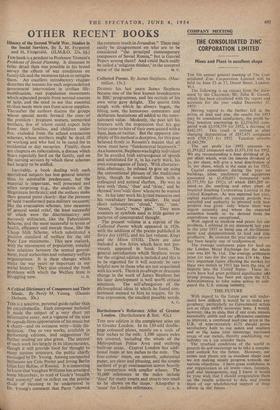DURING his last years James Stephens became one of the
best known broadcasters in BBC programmes, and his recitals of his own verse gave delight. The quaint little cough with which he always began, the lilting, note, the humorous' comments and deliberate hesitations all added to the enter- tainment value. Modestly, the poet left his listeners with the impression that his gay lyrics came to him of their own accord with a buzz, hum or twitter. But the apparent sim- plicity of his method is deceptive, for this poet believed firmly in Rossetti's maxim that all verse must have "fundamental brainwork." Ma humorist, Stephens was highly individual for he avoided Irish extravagance of speech and substituted for it, in his early Work, his own extravagance of fancy. With character- istic. obstinacy, he refused to give up using the conventional phrases of the traditional lyric, though he combined them with a colloquial and natural rhythm. He was in love with 'thou,' thee' and 'thine,' and he rhymed' love'with' dove' whenever he wanted to. In his later work his lyrical measures and his vocabulary became smaller. He used short substantives: cloud," tree," sun,' ' moon," heart," woe," glee.' They were counters or symbols used in little games or patterns of concentrated thought.
The present volume is a reprint of the Collected Poems which appeared in 1926, with the addition of the poems published in Strict Joy (1931), and his last volume, Kings and the Moon (1938). There are also included a few lyrics which have not pre- viously appeared in book form. The general introduction which Stephens wrote for the original edition is included and this is to be regretted for it will scarcely be very helpful now to those who are not acquainted with his work. There is no abrupt or dramatic change in the work of James Stephens but his later development is well worth critical attention. The self-abnegation of the philosophical ideas in which he found con- tentment seemed to him to require, for its true expression, the smallest possible words.
A. C.


































 Previous page
Previous page